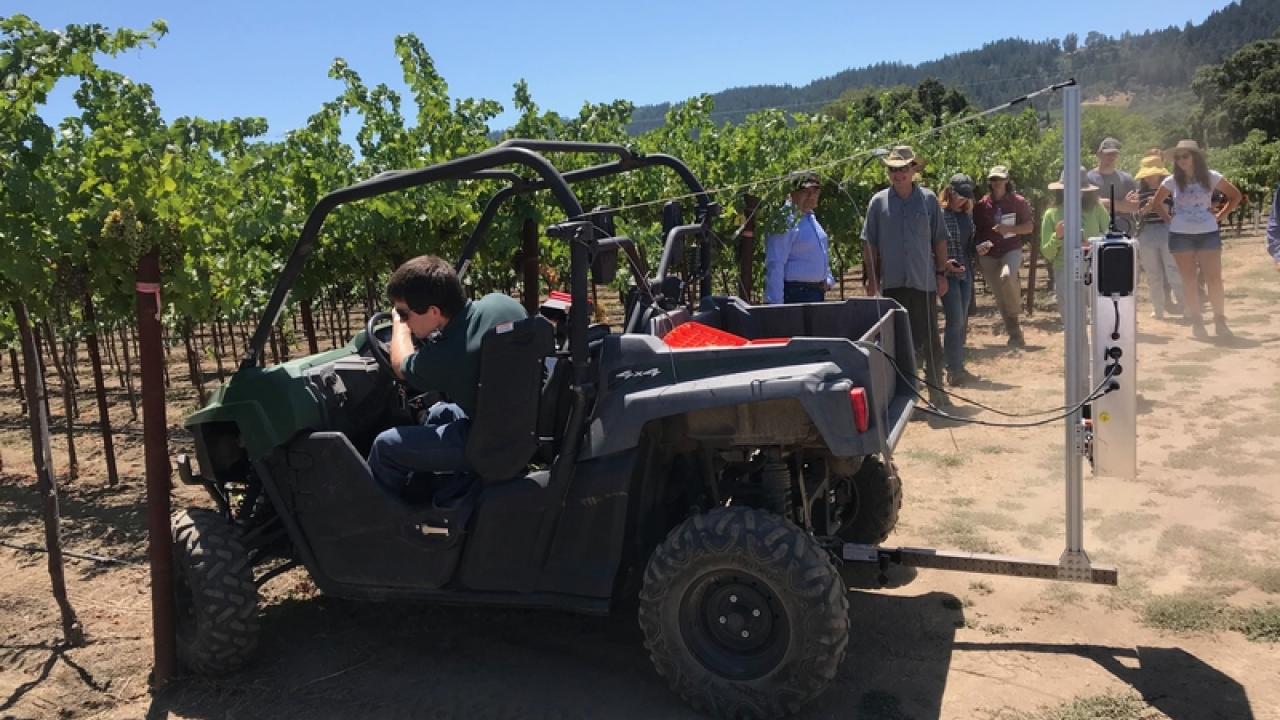
A company is developing a computer vision system to estimate vineyard crop yield with the collaboration of UC Davis scientists.
On Friday, Nathan Strong, president and chief executive officer at Terroir AI in Menlo Park, demonstrated the system at UC Davis’ Oakville Station. Strong installed a box containing four sensor cameras in the back of the station’s ATV, the cameras adjusted for the high-wire trellis system of the experimental block.
The sensors collect data on the number of clusters and volume per row while the ATV or tractor drives up to 5 miles-per-hour; machine learning algorithms then estimate crop yields. “The computer vision tells you what you have right now,” Strong said.
Terroir AI in a second phase of development wants to build artificial intelligence models to predict yields months ahead of harvest, taking into account farming management practices, the environment and other factors, Strong said. This will help farmers meet their targets. Eventually, the units and algorithms will be designed to spot mites for disease detection.
Kaan Kurtural, the assistant cooperative extension specialist in viticulture at UC Davis, has designed the 1-acre fully-mechanized vineyard in Oakville, where Strong has tested the Terroir AI unit. The block includes 1,349 vines that are spaced 1.5 meters by 2 meters - or about 5 feet by 6.5 feet.
Kurtural collaborated with Strong and his team to improve Terroir AI’s computer vision system, including figuring out a way to deal with occlusion from leaves, a common problem found in other automated crop yield systems. Terroir AI’s technology resolved the occlusion issue in part by positioning cameras inside the enclosed unit to shoot the vines from different directions.
The unit captures data from every fourth row of vines at the experimental vineyard in order to reduce the sheer amount of information to be analyzed. That’s enough information to obtain statically accurate results, according to Kurtural.
Terroir AI also has tested the system in commercial vineyards in Napa, Monterey, Paso Robles and Argentina. Fog has not been an issue, Strong said.
Strong, who started the project 1 ½ year ago, said the first commercial unit by March 2020. Prices will vary depending on acreage and other factors. Each unit will cost less than $50,000, according to Strong’s “very rough” estimates. The company plans to first sell the units bundled with two years of processing service.
Strong, who has a doctorate in environmental engineering from Stanford University, was determined to put his PhD to work when he came across the yield count issue in vineyards. He’s enjoyed being out in the vineyards, Strong said. “I love wine. I love the people in the wine industry. Everyone you talk to is so much fun.”
